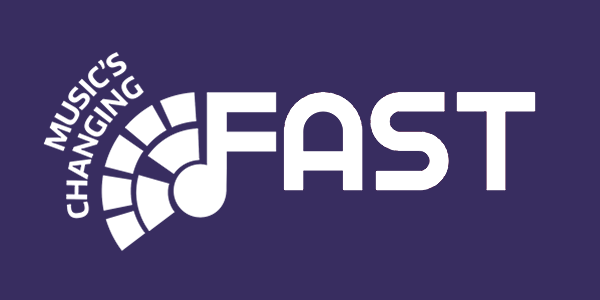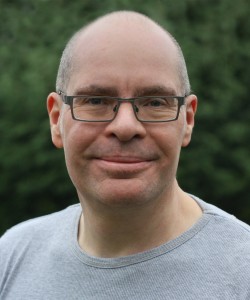in August 2016, FAST interviewed Dr Adrian Hazzard, one of the FAST partners from Nottingham about the FAST project.
- Could you please introduce yourself?
I’m Adrian Hazzard, a Research Fellow at the Mixed Reality Laboratory, University of Nottingham. - What is your role within the project?
I’m a full-time researcher developing and evaluating research projects within the FAST project. - Which would you say are the most exciting areas of research in music currently?
For me it is the creative possibilities that the intersection between music production / performance and digital technologies, in particular web-based and context-aware technologies offer. Web based tools are essentially pervasive across all our everyday digital interactions and this is very much the case with music consumption, you just have to think of Spotify and YouTube. However, we are now increasingly seeing web-based tools seeping into the realm of music production, they offer uniformity, access, sharing and integration with other media on a scale not previously possible. If you then add in approaches such as ‘adaptation’ and ‘augmentation’, where music can adapt or respond in real-time to contextual information, then the future of music listening seems very broad and exciting. We seem to be at a bit of tipping point between the traditional analogue recording studio paradigm, which has formed the design of digital workstations to date and new technologies that may stretch beyond into new paradigms of interaction and consumption. - What, in your opinion, makes this research project different to other research projects in the same discipline?
The FAST project is unique on several levels. As a long-term project (5yrs) it enables for a deep exploration and development of new approaches into music production and consumption that would not be possible on shorter-term research engagements. The academic team consisting of Queen Mary, University of London, University of Oxford and University of Nottingham bring together a diverse, but complimentary set of knowledge and skills and there is a broad range of industry partners who are active in shaping and guiding the projects research agenda. Collectively, these attributes enabled the project to (initially) set out with a broad remit of research: to explore and experiment into many diverse areas of music production and consumption, this has now led to a focusing on a few core areas. - What are the research questions you find most inspiring within your area of study?
I find inspiration in ‘how the composition and production of music can be enhanced and shaped by contemporary digital tools’ and then ‘what do these new forms of musical experience mean for the listener’. - What, in your opinion, is the value of the connections established between the project research and the industry?
The industry connections on the FAST project have been an essential foil for a number of reasons. This research project aims for a significant industry impact, so it is imperative that as an academic team we are sensitive to the current state of the industry, to recognise the challenges and the opportunities at play. Our industry connections give us a unique insight into many areas of the music industry, such as the world traditional recording studios (Abbey Road), and the broadcast industry (BBC). Second, our industry team provide a mentoring and advisory role, from which we can gather constructive criticism of our research directions and outputs. - What can academic research in music bring to society?
Most people engage with music in some form on a daily basis. This might be as entertainment such as listening to music on the radio, a HiFi system or a mobile device; or as part of a formal service or ceremony; or as an accompaniment to a television programme, film or computer game – music is one of the most pervasive media types and it forms an integral part of many of our everyday formal and informal experiences. In short, music is important to society and therefore it is important to understand its role and impact, as well as to explore, and push at, its boundaries. While musical artists, with support from ‘the industry’ are the creative force behind the music we listen to, academia can play a vital role in distilling how music ‘works’ and how technologies can continue to support new creative endeavours, whether in music production or in other disciplines. - Why did you choose this area of research?
My career to date has, in some form or other, revolved around music. I’ve previously worked as a performer, composer and music teacher across a number of settings. I came into academia later on in life and this has offered me a new and exciting opportunity to play some (very small) part in capturing and charting the development of new musical approaches and experiences… what could be better than that! - What are you working on at the moment?
Currently, I’m working on a project called Muzicodes, a web-based music feature recognition system for performers. The system enables an instrumentalist(s) to trigger performance media by playing pre-defined melodic or rhythmic fragments; essentially musical ‘codes’. The performer identifies points in a musical work where they may want to trigger a backing track, or a MIDI event, or a lighting or visual cue of some description. The musical fragment or sequence that is played at point in the music then becomes the trigger for that action. There is an interesting challenge between creating a ‘code’ that is both suitable for the musical work and consistently recognisable by the system. - Which is the area of your practice you enjoy the most?
That’s a tricky question, as I enjoy many different aspects of this practice. For instance, I particularly enjoy the generation of research ideas, bouncing them off different people or reading something that inspires and leads you to the formation of a particular idea. Having said that, the following realisation of a research idea or ‘thing’ is equally exciting, although sometimes they are accompanied by a healthy frustration of seeing what they could have been given more time, resources and skill. - What is it that inspires you?
Any creative musical interaction, whether it is a great composition or a musical expression on an instrument performed with conviction.



